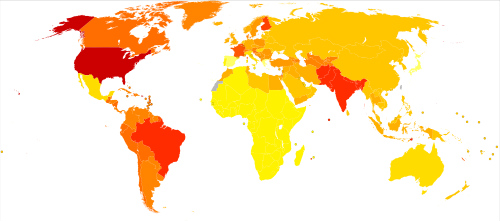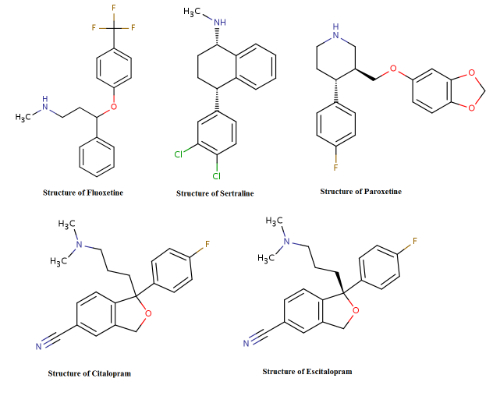- U.S. Preventive Services Task Force has recommended that clinicians routinely screen all adults for depression.
- Depression is among the leading causes of disability in the U.S. among people aged 15 years and older, affecting individuals, families, businesses, and society as a whole.It is among common among patients in the primary care setting.
- The Task Force has specifically recommended screening women who are pregnant and those who have recently given birth.
- Screening should be implemented in a routine manner; adequate systems should be in place to ensure accurate diagnosis, effective treatment, and appropriate follow-up, the Task Force recommended.
Depression is among the leading causes of disability in the U.S. among people aged 15 years and older. (Figure 1.) It is associated with significant deleterious effects among individuals, families, businesses, and society in general. It appears to be among the most common illnesses among patients seeking care in the primary care setting. Depression is also common in pregnant women and those who have recently given birth, negatively affecting both the mother and the child.(Figure 2.)
The U.S. Preventive Services Task Force (USPSTF) has recommended that clinicians screen all adults for depression, particularly in the primary care setting. The USPSTF reported finding reliable evidence that screening improves the accurate identification of adult patients with depression in the primary care setting, including women who are pregnant or have recently given birth. The final recommendations can also be found in the January 26, 2016 online issue of the Journal of the American Medical Association (JAMA).

(Darker areas represent zones of higher incidence.)
The Benefits of Early Detection, Intervention, and Treatment
The USPSTF concluded that programs which combine depression screening with adequate treatment improve clinical outcomes in adults, including pregnant women and those in the postpartum stages. Antidepressant therapy for adults and older adults, along with psychotherapy, or a combination of the 2, has been shown to decrease clinical morbidity. The use of cognitive behavioral therapy (CBT) in new mothers and in women who are pregnant was similarly found to improve clinical outcomes.
Screening and Early Detection
The USPSTF found no evidence of clinically significant harm associated with screening for depression in these 4 populations (pregnant women, women in the postpartum phase, adults, and older adults). Similarly, there was no evidence of harm associated with the use of CBT in pregnant women or new mothers.

Prevention
The Community Preventive Services Task Force, which makes evidence-based recommendations on preventive services for community populations, recommended collaborative care for the management of depressive disorders as part of a multicomponent, healthcare system-level intervention that uses case managers to link primary care providers, patients, and mental health specialists. More information about the Community Preventive Services Task Force and its recommendations on depression interventions is available on its website.
Treatment
Effective treatment of depression in adults (Figure 3) generally includes antidepressants or specific psychotherapy approaches (eg, CBT or brief psychosocial counseling), alone or in combination. Given the potential harms to the fetus and newborn child from certain pharmacologic agents, clinicians are encouraged to consider CBT or other evidence-based counseling interventions when managing depression in pregnant women or those who are breastfeeding.

The Task Force identified second-generation antidepressants (mostly selective serotonin reuptake inhibitors [SSRIs]) (Figure 4) as being associated with potential harm to patients, such as an increased suicidality in adults aged 18 to 29 years and increased risk of upper gastrointestinal bleeding among patients aged >70 years. The risk appears to increase with age. However, the magnitude of these risks is small and is proportionately small relative to the risks associated with depression.

Importantly, the Task Force reported finding evidence of potential serious harm to the fetus when a pregnant woman is administered pharmacologic treatment for depression. However, the likelihood of serious harm was called “low.” Therefore, the USPSTF concluded that the overall magnitude of harm is small to moderate. Nonetheless, the Task Force recommended CBT over pharmacologic therapy for pregnant women.
USPSTF Conclusions
Overall, the USPSTF concluded that there is a significant net benefit to screening for depression in adults, including older adults, who receive care in clinical practices that have adequate systems in place to ensure accurate diagnosis, effective treatment, and appropriate follow-up after screening. The USPSTF also concluded that there is a net benefit to screening for depression in pregnant and postpartum women who receive care in clinical practices that have CBT or other evidence-based counseling available after screening, according to the report published in JAMA.
Resources
- The USPSTF has made recommendations on screening for depression in children and adolescents and screening for suicide risk in adolescents, adults, and older adults. Click here for more information.
- The Substance Abuse and Mental Health Services Administration maintains a national registry of evidence-based programs and practices for substance abuse and mental health interventions that may be helpful for clinicians looking for models of how to implement depression screening.
